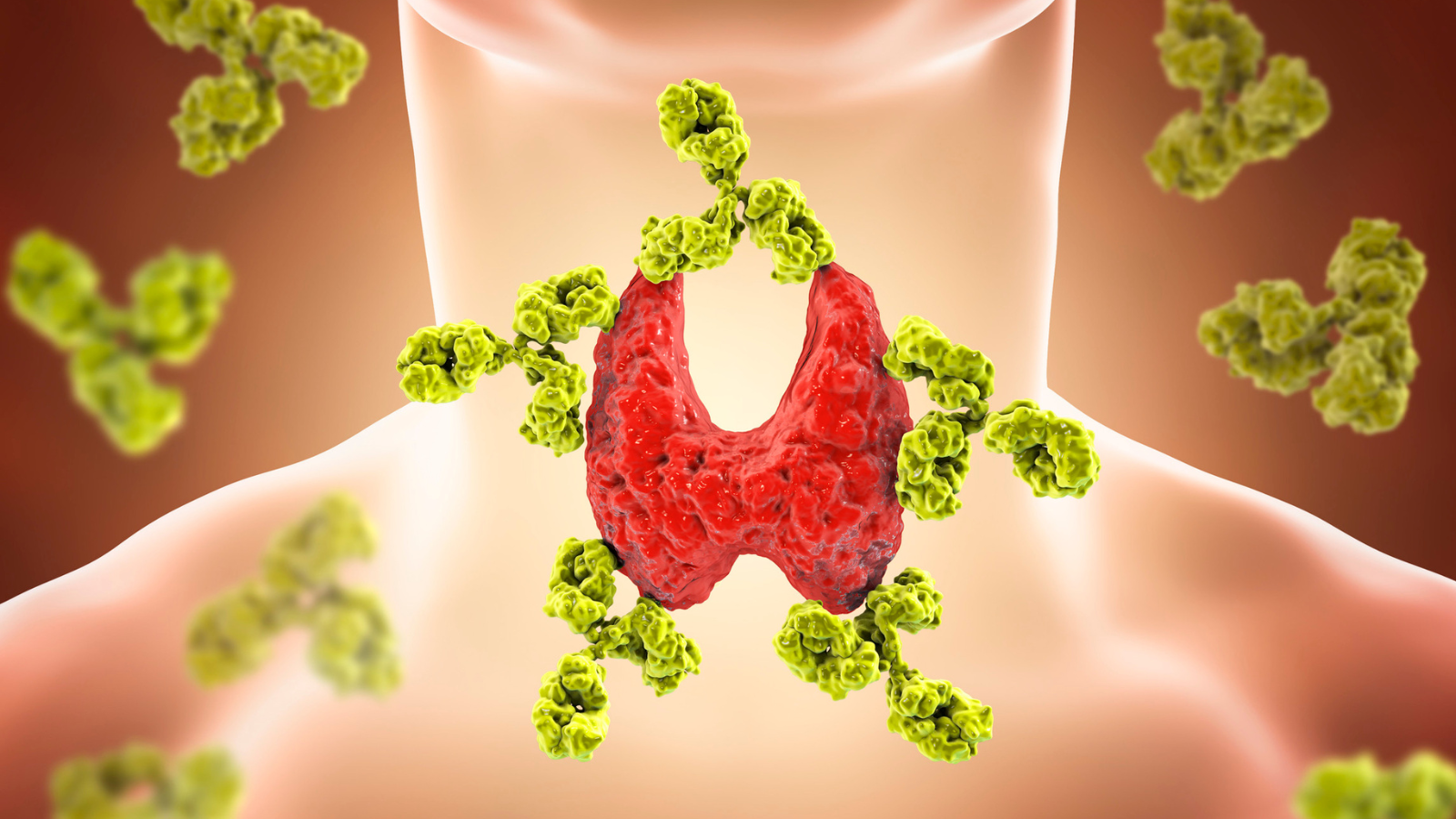There are multiple different thyroid disorders you can develop — each of which has a unique set of symptoms. Therefore, finding the right treatment will depend on the type of thyroid disorder you have.
Below we detail some of the most common types of thyroid disorders.
Hypothyroidism
Underactive thyroid, or hypothyroidism, occurs when your thyroid stops producing enough of the hormones needed for your body to function properly. Common symptoms of an underactive thyroid include weight gain, depression and fatigue.
Hypothyroidism can often be misdiagnosed due to its symptoms being associated with other conditions or lifestyle factors. The symptoms of hypothyroidism can also develop slowly over time – in fact, you might not even realise there is anything wrong until your symptoms become severe.
If hypothyroidism is left untreated, the condition can result in a low-pitched voice, a slower heart rate and iron-deficiency anaemia.
Causes and risk factors
Hypothyroidism is often caused in one of two ways. Firstly, by your immune system attacking your thyroid gland and, secondly, from receiving thyroid gland treatment to treat either cancer or an overactive thyroid. Babies can also be born with congenital hypothyroidism but this is more uncommon.
Other potential causes for hypothyroidism include a pituitary gland disorder and taking certain medications.
Some people can be at increased risk of developing hypothyroidism, with some of the main risk factors including:
Other health conditions, like diabetes, rheumatoid arthritis or lupus
Being a woman (particularly a woman over the age of 60)
Pregnancy
A family history of the condition
Hyperthyroidism
Hyperthyroidism, or an overactive thyroid, is where your thyroid overproduces hormones. Although these hormones are necessary for your body to function healthily, too many of them can cause disruption and uncomfortable symptoms.
Common symptoms of hyperthyroidism can include anxiety, mood swings, difficulty sleeping and an increased need to urinate. All of these symptoms might be misdiagnosed as other health conditions, which is why testing is so essential.
Causes and risk factors
Although anyone can develop hyperthyroidism, it’s more common in women between the ages of 20 and 40 years old. This is thought to be due to the hormonal changes that women naturally go through during these ages, such as pregnancy, or later, menopause.
There are multiple potential causes of hyperthyroidism. These can include:
Autoimmune conditions such as Graves’ disease
Thyroid nodules
Certain medications, particularly ones that contain iodine
Thyroiditis (inflammation of the thyroid)
Thyroid cancer
Like hypothyroidism, certain people are at more risk of developing hyperthyroidism. This includes:
Pregnant women
People with a family history of the condition
Patients with autoimmune conditions
Patients with a history of chronic illnesses like iron deficiency anaemia
Women between the ages of 20 and 40 years old
Autoimmune thyroid disorders (Hashimoto's and Graves' disease)
Some thyroid disorders are autoimmune disorders. This means that the antibodies from your immune system attack your thyroid by mistake.
Two of the main examples of this are Hashimoto’s disease and Graves’ disease.
Neither Hashimoto’s nor Graves’ disease can be cured. They are chronic, lifelong conditions that need to be managed with the right treatment plan. However, by treating hyperthyroidism and hypothyroidism, you can lead a life with minimal symptoms.
Causes and risk factors
Hashimoto’s disease and Graves’ disease are a result of your immune system malfunctioning, causing your antibodies to attack your thyroid tissue.
Certain risk factors can elevate your risk of this happening. These include:
Goitre
A goitre is a lump or swelling in your neck that’s caused by a swollen thyroid. While they are not a serious condition, it’s always best to have them checked by a doctor.
Goitres can cause symptoms such as a persistent cough, changes to your voice, difficulty swallowing and a feeling as if something is stuck in your throat.
Causes and risk factors
A goitre can be caused by many different factors, such as hyperthyroidism and hypothyroidism. Therefore, if you already have a thyroid disorder, you can be at a higher risk of developing one.
Some other potential risk factors can include:
Thyroid nodules
Not to be confused with a goitre, thyroid nodules are non-cancerous growths that develop on, or inside, your thyroid. These can then lead to an overproduction of thyroid hormones and result in hyperthyroidism.
Causes and risk factors
The main cause of thyroid nodules is an overgrowth of thyroid tissue. However, they can also be caused by other factors, such as cysts, chronic inflammation and thyroid cancer.
Risk factors for developing thyroid nodules typically include:
Thyroid cancer
Thyroid cancer is rare in the UK and, like other forms of cancer, can range in its level of severity.
Some of the main symptoms of thyroid cancer can include:
A hard, painless lump in the front, lower part of your neck
A sore throat
Difficulty swallowing
Pain or pressure in your neck
A red face
Soft stools or diarrhoea
Weight loss
A cough
There are four different types of thyroid cancer — papillary carcinoma, follicular carcinoma, medullary thyroid carcinoma and anaplastic thyroid carcinoma. Anaplastic thyroid carcinoma is the rarest form, with papillary carcinoma being the most common.
Causes and risk factors
In most diagnosed cases of thyroid cancer, the cause is unknown. However, some factors can increase your risk of developing it. These can include:
Having a pre-existing thyroid condition
Having a family history of thyroid cancer
Having a previous non-cancerous breast condition
